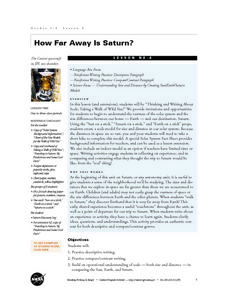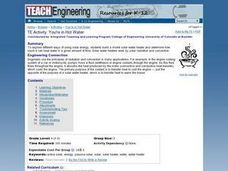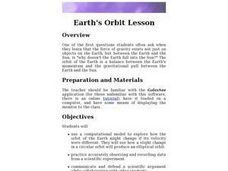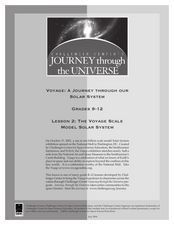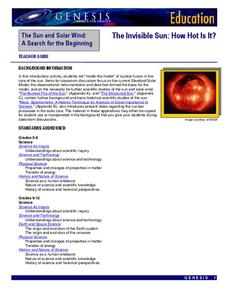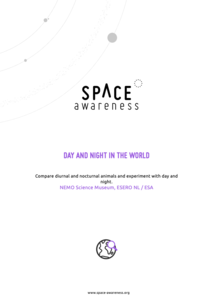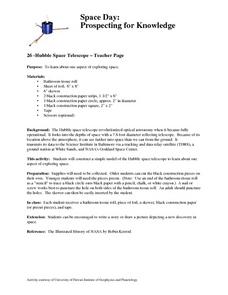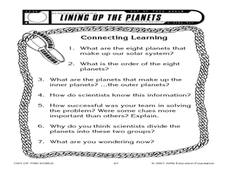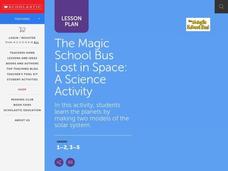Curated OER
How Far Away Is Saturn?
Young scholars work together to create a scale model of the solar system. They write a descriptive paper and a paper comparing and contrasting the Earth to Saturn. They discuss their writings with the class.
Curated OER
Earth, Sun and Moon
Pupils explore, experiment and study how the Earth orbits the Sun once a year and how the moon takes approximately 29 days to orbit the Earth. They access an online activity to examine the process of how the Sun is at the center of the...
Curated OER
Sun Shadow Cycles
Students use diagrams to review how the Earth rotates around the sun. In groups, they use the same diagrams to explain how the sun shadows are produced and how they differ between seasons. They describe the Earth's rotation and...
Curated OER
Planets an Introduction
Fourth graders investigate one planet, enter information into a database, and print the database sorting for each of the attributes.
Curated OER
Inner Planets
Students create a booklet about the inner planets after researching the characteristics of each planet. Students research the following items for each planet: moons, size, rotation, orbit, atmosphere, an interesting fact. Their final...
Curated OER
Modeling Hot and Cold Planets
Students, in teams, design and construct models of two planets, one hot and the other cold, using a variety of materials. They attempt to create the models out of substances that will actually show the greatest temperature differences...
Curated OER
TE Activity: You're in Hot Water
Students study different ways of using solar energy. They design a solar water heater and determine how much water it can heat in a set amount of time. They examine how the heaters work by solar radiation and convection.
Curated OER
Models of Planets
In this planet models worksheet, students use the radius of a given planet and its mass to answer questions using a model of a planet with a given radius. They determine the volume of the planet's inner core, the volume of its outer...
Curated OER
Understanding the Rutherford Model
In this Rutherford model worksheet, students read about Rutherford's experiment with gold foil and alpha particles which led to the discovery of subatomic particles. Students answer six analysis questions about the experiment and...
Curated OER
Pioneers of Space
Students explore how to use natural resources in the next millenium. Students create a KWL chart and then research information on our solar systsem, natural resources, and environments. Students build a model of a future community and...
Curated OER
Earth's Orbit Lesson
Tenth graders devise a computational model to explore how the orbit of the Earth might change if its velocity were different. Using accurately recorded data, 10th graders defend a scientific argument.
Curated OER
The Voyage Scale
High schoolers identify how models are powerful tools of exploration and that the sizes of the planets and distances between the planets in the Solar System span a large range. They make a sign for each planet they have created in the...
Curated OER
Glowing Glimpses of Our Universe
Students will complete hands-on space activities. In this space science lesson, students will create a glow-in-the-dark model of the solar system, visit a planetarium, make star pictures, and paint constellations. Activities are meant to...
Curated OER
Space Science: Constellations and the Sun
Learners review the zodiac signs and illustrate their movement using constellations on the wall and themselves to represent earth. Individually or in groups, they stand in the center of the room while a shadeless lamp is placed between...
Curated OER
Stellar Lunar Curriculum
Students engage in a lesson that covers the concept of different phases of the moon. They name the cycles of the phases of the moon while using flashlights to simulate the light of the sun. They research information about several...
University of Colorado
Looking Inside Planets
All of the gas giant's atmospheres consist of hydrogen and helium, the same gases that make up all stars. The third in a series of 22, the activity challenges pupils to make scale models of the interiors of planets in order to...
NASA
The Invisible Sun: How Hot Is It?
It's getting hot in here! The first in a series of six lessons has learners model nuclear fusion with a simple lab investigation. Groups collect data and analyze results, comparing their models to the actual process along the way.
Space Awareness
Day and Night in the World
How do different parts of the world experience day and night? Introduce scholars to the concept of global citizenship while teaching about animal behavior with discussion of nocturnal and diurnal animals. Then, learners complete...
Curated OER
The Climate Change Skeptic's Argument: Natural Solar Cycles or Human Activity?
Teachers explore patterns in sunspots and total solar irradiance to understand the counterpoint to the human effect of global warming. In this professional development tool, teachers work through a lesson on the sun's natural patterns to...
Curated OER
Spacd Day:Probing For Knowledge
Students investigate the uses and purpose of the Hubble telescope. They create a model of the telescope and conduct research about the history behind the invention of it. Students use the information in order to create a context for the...
Curated OER
Lining up the planets
Students follow cue cards in order to order the planets in the correct order in the solar system. In this planets lesson plan, students work in groups to make a 2D model of the planets.
Curated OER
The Magic School Bus Lost in Space
Students learn along with Ms. Frizzle's class. In this Magic School Bus lesson plan, students explore outer space as they visit the Sun, Mercury, Venus, and Mars in order to learn about our solar system.
NASA
Development of a Model: Analyzing Elemental Abundance
How do scientists identify which elements originate from meteorites? Scholars learn about a sample of material found in a remote location, analyzing the sample to determine if it might be from Earth or not. They study elements, isotopes,...
Chicago Botanic Garden
GEEBITT (Global Equilibrium Energy Balance Interactive TinkerToy)
Students use the GEEBITT excel model to explore how global average temperatures are affected by changes in our atmosphere in part two of this series of seven lessons. Working in groups, they discuss, analyze graphs, and enter data to...
Other popular searches
- Solar System Model
- Rubric Solar System Model
- Space Solar System Model
- Solar System Model Projects
- The Solar System Model
- Build Solar System Model
- Solar System Scale Model
- Solar System Model Lessons
- Building Solar System Model
- Scale Model of Solar System
- Solar System Model of Clay


